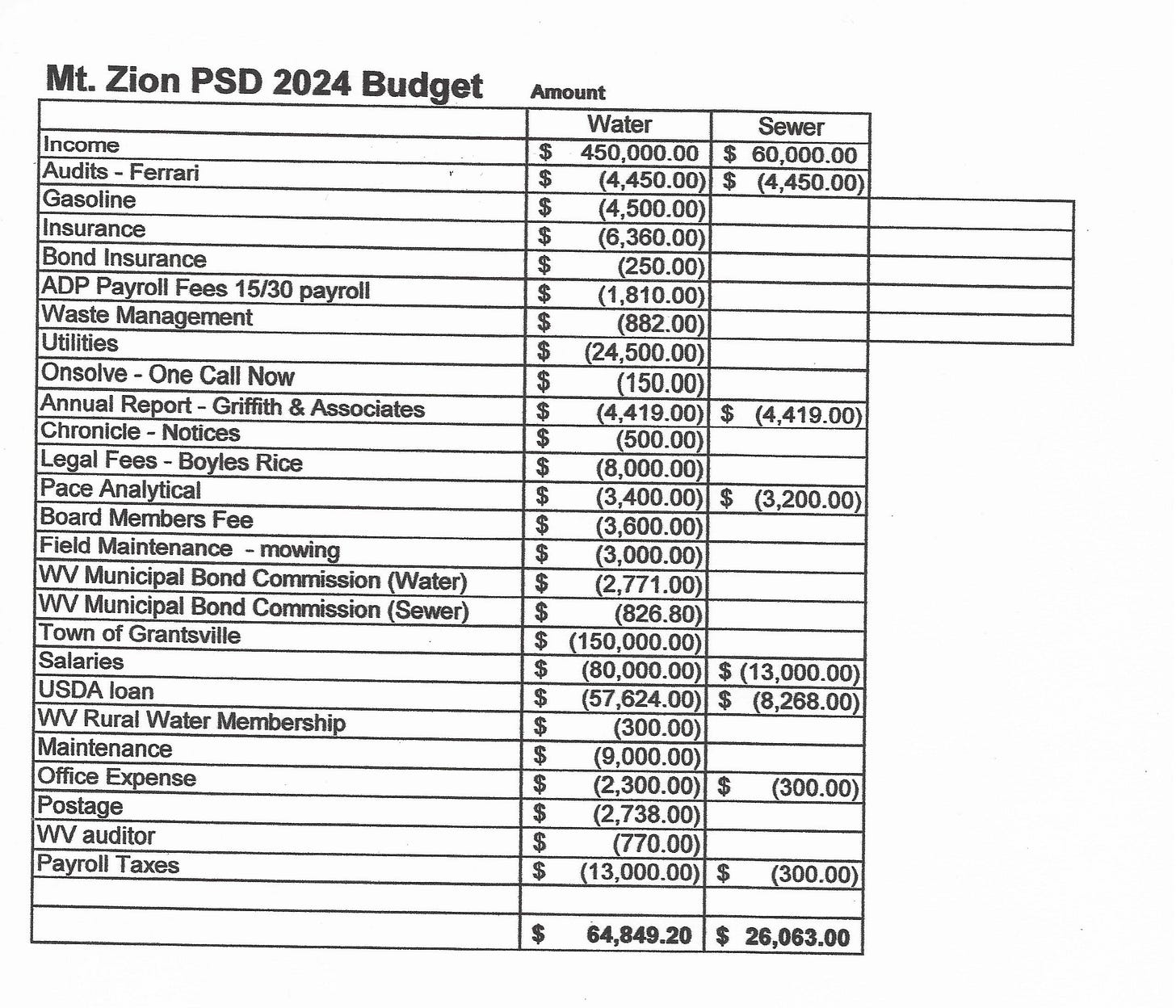For years, the Grantsville water plant has operated with a deficit, subsidized by other town accounts and funds. The Grantsville plant also treats the water collected and sells it wholesale to the Mt. Zion and Pleasant Hill Public Service Districts.
The editor of The Calhoun Chronicle recently claimed that the recently proposed Emergency Rate Increase of 60% will affect not only those residing in Grantsville but also those in the other PSD districts. This is incorrect, as those PSDs set their own rates by law. With this rate increase, the outlying PSDs and the town have negotiated a $1 per 1000-gallon increase on the wholesale rates.
In addition, the editor of The Calhoun Chronicle has claimed that those living in Grantsville will be “hit by a larger sewer bill since the sewer bill is 150 percent of the water bill.” This is also untrue. Sewer rates are based on usage (gallons) and not cost (rates).
But does the town really NEED such a rate? Let’s compare the financials of the three PSDs.
The Mt. Zion PSD budget is balanced and in the black. The average base water rate for users in that district is around $44.00.
The Pleasant Hill PSD budget also stands in the black. The base rate for users in that region is $31.48.
The Grantsville water plant, which again, provides the other two PSDs with already-treated water, operates, in general, with a $55,000 annual deficit. The base rate for users on the town water system is $18.18 a month, with the increase raising the base rate to $29.09, which is still lower than the cost to citizens served by the other PSDs.
“The water plant is sucking the life out of every other account,” Bob Petrovsky, mayor of Grantsville noted. “We’re just trying to pay the bills.”
There have also been efforts and talks to consolidate the three PSDs to become one. Petrovsky, who is interested and supportive of consolidation and working with the other PSDs, does have concerns. “We can’t consolidate and bring nothing but debt to the table,” he noted, saying the town is also working diligently to repair leaks within the town and prepare to be in a financially healthier position in future consolidation discussions.
Is it fair for Grantsville residents to pay a lower rate than the outlying residents for the same water? Is it fair for the main water plant in the county to operate for years in debt when the outlying PSDs are dependent upon the central supply but doing well financially?
The Grantsville plant also carries the financial burden of repaying five USDA bonds for water plant and system upgrades, to the tune of $136,392 per year — upgrades that benefit ALL who have water services.
But there is an effort, apparently NOT by the 1982 Foundation (but posted on their Facebook page by their Board President and offered centrally from their office on Main Street), to circulate a petition again, and again to stop this long overdue rate increase. (They have already succeeded in stopping the increase once.)
Even with this rate increase, Grantville could still experience an annual shortfall of about $30,000 a year.
If the residents of Grantsville, and those serviced by Mt. Zion and Pleasant Hill wish to continue having reliable, well-treated water, why would they not support efforts to finally bring the Grantsville plant up to date, with repairs and properly certified and compensated technicians?
What do you think? Should the Grantsville water plant continue to decline physically and financially and risk the reliability and water quality provided to citizens? Or, should the citizens, despite the increase, support the efforts to maintain and operate the plant as a sound business that can provide reliable services?
Please share your thoughts, either here with me, or with the mayor and council members who have been beaten and berated off and on over the last several months on The Ridgeview News, in The Calhoun Chronicle, and on The 1982 Foundation Facebook page (which they are all blocked from seeing) for their attempts to bring the Grantsville water plant up to par.
These folks are trying to make improvements, as well as create a fiscally responsible budget to sustain and maintain the system. They need your support.





